When the president is right, he’s right. On Sunday evening, en route to Washington following a very successful weekend of playing golf, Donald Trump told the press on Air Force One that crashing markets won’t cause him to abandon his trade policy. “I don’t want anything to go down,” he said, “but sometimes you have to take medicine to fix something.”
He’s right. Conservatives understand better than anyone that long-term solutions may require near-term disruption. If you want to balance the budget and reduce the national debt, the only way to do it is by reforming entitlements. That won’t be painless. But sometimes you have to take medicine to fix something.
Some Trump supporters have even analogized his new tariffs to specific types of medicine, like chemotherapy. But here’s the thing about chemo: There’s a plausible, measurable goal that it’s supposed to achieve.
You take the medicine and, hopefully, the cancer inside you dies. You reform Medicare and Social Security and, hopefully, the government runs an annual surplus. But if the cancer doesn’t die, or if the reforms you’ve made to entitlements end up growing the deficit by crushing economic growth, the treatment has failed. You don’t continue it and suffer pointlessly. You try something different.
Last night economist Jessica Riedl applied that logic to the president’s decision to declare a trade war on nearly every nation on Earth simultaneously. How does he define “success” in this gambit, Riedl wondered. What’s the plausible, measurable goal that Trump is supposedly trying to achieve? Is he aiming to add a certain number of new American manufacturing jobs or generate a given dollar amount in new tax revenue or reduce foreign tariffs by a particular percentage?
How does he define “failure”? A recession—or depression? A 25 percent decline in the S&P 500? A 50 percent decline?
“If there is no measurable metric of success or failure then the tariffs are not economic policy—they are an economic suicide pact in service of some philosophical aversion to trading with and being interdependent with foreigners,” Riedl wrote.” And we're all just collateral damage.”
Trump does have a measurable metric of economic success, it turns out, but it’s so implausible that it amounts to no metric at all. “I spoke to a lot of leaders, European, Asian, from all over the world," he told reporters on Air Force One. "They’re dying to make a deal. And I said, we’re not going to have deficits with your country. We’re not going to do that, because to me a deficit is a loss. We’re going to have surpluses or at worst, going to be breaking even.”
Success for the White House, in other words, is the end of American trade deficits altogether, which is about as sensible and realistic as you insisting that any business from which you buy stuff should buy at least as much from you. Try that and see how it goes. Offer to sell the checkout clerk something the next time you’re at the supermarket and, if he refuses, look at him sternly and say, “To me, a deficit is a loss.”
Trump isn’t the first president in my lifetime to make a terrible decision that badly hurt America, but he is the first president to betray not even a basic grasp of the implications of his own policy. Starting a global trade war in hopes of erasing all U.S. trade deficits is like starting a healthy person on massive doses of chemo to cure a cancer they don’t have. It’s not just a catastrophe, it’s a catastrophe derived from ignorance so phenomenal that no one who’s guilty of it could possibly end up in a position of authority—one would think.
That’s beginning to sink in among some of the president’s supporters who do understand how trade works and who convinced themselves that he’d be good for the economy. The doctor whom they chose to administer economic “medicine” to them and to the rest of the planet has turned out to be a giant quack. What have they done?
Friends and enemies.
Trump’s philosophy divides the world into friends and enemies. The first gets rewards, the second gets punished. For his friends, everything. For his enemies, the law.
The business types who supported him last year were fine with that. More than fine, actually—they were counting on it. Pro-Trump tech bros and hedge-fund-ers looked forward to tax cuts and deregulation for themselves and state-imposed hardships for immigrants and the “woke” left. “I feel liberated,” one top banker famously told the Financial Times a few days before the inauguration. “We can say ‘retard’ and ‘pussy’ without the fear of getting cancelled … It’s a new dawn.”
He and his ilk were the president’s friends. They had nothing to fear.
The problem (well, one of the problems) with running the country as a “friends and enemies” patronage racket, though, is that it requires the leader to be able to distinguish his friends from his enemies. ”He’s not hurting the people he needs to be hurting,” a MAGA voter memorably complained to the New York Times during a Trump-instigated government shutdown in 2019. That same complaint is being heard today among the pro-Trump business class. Having rallied behind the head of the Leopards Eating People’s Faces Party, they’re mortified to discover that the faces being eaten are their own.
Getting to use the “r-word” again wasn’t supposed to be this expensive.
The living, breathing embodiment of Trump’s business-class support is of course Elon Musk, history’s richest man and a noisy detractor of the “woke mind virus.” Musk is enough of a sycophant to have donned a “Trump Was Right About Everything” cap during a recent Cabinet meeting, but it turns out that he (or his hat, rather) spoke too soon. “Liberation Day” seems to have convinced Elon that the president isn’t right about everything after all.
This weekend Musk wandered far off the reservation by telling an audience that he hopes all tariffs are lifted between the United States and Europe and that people in both jurisdictions are eventually free to work on either continent. Two days earlier he dismissed arch-protectionist Trump adviser Peter Navarro’s defense of the new tariffs with a piquant, “He ain’t built sh-t.” This morning Musk posted a clip of Milton Friedman rhapsodizing over how free trade makes pencils affordable despite the far-flung origins of their individual components, which at the moment practically qualifies as throwing in with “resistance” liberalism.
Musk has become an embarrassingly dogmatic postliberal except with respect to the subject of his own expertise, global business. He went to bat for skilled immigration back in December when MAGA racists began grumbling about the scourge of H-1B visas for Indian STEM grads, and now he’s speaking up against injecting economic chemo into a healthy America. Elon knew last year that tariffs were coming and expected that they would cause “a severe overreaction in the economy” but he seems caught off-guard by the scale of what Trump ordered—or, perhaps, by the surprising fact that his own ox is being gored.
The president isn’t (just) hurting the people he needs to be hurting. He’s hurting Silicon Valley and Wall Street. His friends.
Financier Bill Ackman is another mega-rich latecomer to the MAGA movement, joining Musk in the strange new digital-era turnabout of business elites eagerly consuming conspiracy theories instead of inspiring them. Ackman has become a loyal Trump apologist but he too found the logic of “Liberation Day” butting up against his own decades of experience on Wall Street. We need to fix tariffs, he conceded in a Twitter post on Sunday night, but “business is a confidence game. The president is losing the confidence of business leaders around the globe.” Comparing the tariffs to an economic nuclear war, he declared, “This is not what we voted for.”
It assuredly is what he voted for. There was no topic during the campaign on which Trump was clearer and more insistent than his devotion to tariffs, except perhaps for his intentions to pardon the January 6 miscreants.
What Ackman means, though (I think), is that he didn’t vote for tariffs to be implemented this broadly and incompetently. By tariffing the whole world instead of select targets, Dr. Trump has administered a dangerously potent round of chemo. He can’t tell America’s enemies, like China and “woke” universities, from its friends, like Canada and Bill Ackman, and now both groups have overdosed. That undercuts the core promise of patronage politics.
Not only that, his bedside manner has been terrible. The president and his aides simply can’t get their stories straight. Protectionists like Navarro and Stephen Miller keep saying that the tariffs are here to stay because they realize that companies won’t repatriate jobs to America until they’re sure that investing here is their least expensive option. But free-marketeers like Kevin Hassett and Brooke Rollins keep winking at the possibility that trade deals might be signed that will ease the crisis, with Trump himself boasting in a Truth Social post on Monday that a Japanese delegation is en route to the U.S. to talk.
“I've never seen as much incoherence and irrationality as we saw on television today (from Trump Administration officials),” former Treasury Secretary Lawrence Summers said on Sunday. “This Administration doesn’t have a coherent message on why it's doing the largest tax increase the country's had in 50 years. Usually when you do something consequential, you have a clear rationale that's consistently delivered, and we're not getting that.”
We’re in the worst of all worlds so long as that incoherence and uncertainty persist. Markets are crashing, crushing American investors, yet businesses won’t commit to expensive capital investments in the United States because they can’t be sure that Trump won’t change his mind tomorrow. When a smart (if self-deluded) guy like Bill Ackman looks at that, I imagine the obvious stupidity of it raises a terrifying possibility to him: Could it be that Dr. Trump … doesn’t actually know how to practice medicine?
Bill, I have bad news.
He doesn’t know how to practice medicine.
No way out.
Historians will debate until the end of time how brilliant business successes like Ackman and Musk managed to convince themselves that an outspoken protectionist who’s plainly mentally unbalanced was the physician with the cure for what ailed the American economy. The average joe has a ready excuse—the economy in 2019 was great, case closed—but billionaires are supposed to understand policy at a more sophisticated level than that to protect all the skin they have in the game. Either they didn’t believe Trump when he chattered excitedly about tariffs 8,000 times on the campaign trail (“take him seriously, not literally!”) or they assumed that cooler heads, like Treasury Secretary Scott Bessent, would prevail upon him as they did in his first term.
They probably reassured themselves that a president whose whole shtick is “for my friends, everything,” would listen to his friends when they tell him that something he’s doing is nuts.
What they didn’t anticipate, I think, was how ignorant Trump would turn out to be of his own pet issue. Usually when a politician devotes lots of thought and political capital to a subject, he can be trusted to know it inside and out. Not this time. The formula the president used to calculate his “Liberation Day” tariffs wasn’t just verkakte, it apparently included an error so basic that the tariff rates it produced ended up fully four times higher than they should have been.
And by basing each country’s tariff rate on the size of America’s trade deficit with that country instead of on how aggressively each taxes U.S. imports, he’s made it all but impossible for some nations to negotiate even if both sides are willing. What’s a poorer country like Cambodia supposed to do to bring down the president’s new rate except figure out a way to get much, much richer quickly and then buy everything from us?
When Trump talks about tariffs, he doesn’t even sound like he’s talking about tariffs. He sounds like he’s talking about sanctions. On Sunday he told reporters that he wants Europe to “pay us a lot of money on a yearly basis, number one for [the] present but also for [the] past because they’ve taken a lot of our wealth away,” which sounds like reparations. Why would Europeans agree to compensate us for years of selling us stuff that we wanted to buy?
On Monday morning, with investors wringing their hands about another bloodbath in the stock market, the president urged Americans to look on the bright side. “Oil prices are down,” he cheered. But the reason oil prices are down, obviously, is that businesses are now expecting an economic slowdown caused by his tariffs. Demand for fuel is slackening, and so fuel prices are slackening with it. He’s so ignorant of this—or thinks you are—that he’s celebrating that indicator.
He doesn’t know how to practice economic medicine even at an elementary level, it seems. Ackman and other well-heeled Trump voters are discovering that the hard way this week along with the rest of the country. And so I suspect many of them are suddenly reckoning with a hard, and unusual, question: What have we done?
The closest thing in my lifetime to a president being elected in the belief that he’d be one thing before quickly turning into something entirely different was George W. Bush ditching the “compassionate conservatism” of the 2000 campaign to become a nation-building warfighter. But Bush was reacting to events, of course: September 11 placed the country on a war footing that persisted long enough to make the Iraq war broadly popular when he launched it in early 2003. America changed, and the president changed with it.
Trump’s heel turn from economic hero to economic villain has a purer “false pretenses” air to it. He’s like a cardiac surgeon who faked his credentials but managed not to kill anyone during his first stint at the hospital because the talented doctors around him in the operating room guided his hands. Now he’s back for a new stint and brought his own staff with him, and the first thing they’ve decided to do is the economic equivalent of transplanting a pig heart into someone just to see what will happen.
Maybe it’ll work out. You never know!
The wrinkle in that analogy, though, is that the patient will die but at least you can fire the surgeon. There’s no way to fire or even realistically restrain Dr. Trump.
The yes-men around him in the operating room owe him their jobs and won’t dare tell him he’s crazy. Republican toadies inside the Capitol fear him and his supporters more than they do a global economic depression and electoral backlash. The 35 to 40 percent of the country that represents his core base is too cultish and/or too embarrassed to admit they were duped by a heart surgeon with a diploma from Trump University, so they prefer to rationalize the hardships he’s imposing, increasingly in vaguely communist terms.
Perhaps the Supreme Court will step in and stop him by finding that his “emergency” tariff powers are unlawful in a year or two, long after the American patient has expired because the new pig heart didn’t take.
The only way we’re getting out of this without significantly more damage is if Dr. Trump somehow learns to practice medicine on the fly, but even that’s not a perfect solution. If he came to his senses and lifted the tariffs tomorrow, he’d already have shown investors that he’s capable of committing economic malpractice on a scale large enough to incinerate trillions of dollars in global wealth. Unless Congress takes his medical license away by repealing his tariff authority, he could start operating on another patient at any time.
Regardless of what happens going forward, how can Wall Street and international markets ever feel confidence in his economic stewardship again?
He’s not going to come to his senses, though, because he believes too fervently in tariffs and in his own image as some sort of economic genius. He has no metric for failure, to answer Jessica Riedl’s question earlier. He might fail politically, by alienating so many voters with his protectionist scheme that he’s forced into a face-saving permanent “pause,” but no amount of data will convince him that his plan failed economically. It would take an unusual degree of intellectual modesty for an old guy who’s clung to a foolish belief his whole life to admit error once he finally got to see it in action, and the president isn’t known for modesty.
He’s a “Tariff Man” and always will be, whatever that might mean for your retirement nest egg. The closest we’ll get to a Trump mea culpa is him conceding that he didn’t anticipate how ruthlessly “globalists” would sabotage his brilliant “Liberation Day” plan.
There’s no way out of this, which is why it was so important last November not to get ourselves into it in the first place. The doctor will be in the operating room for the next 46 months. The patient will be unrecognizable when he’s finished.
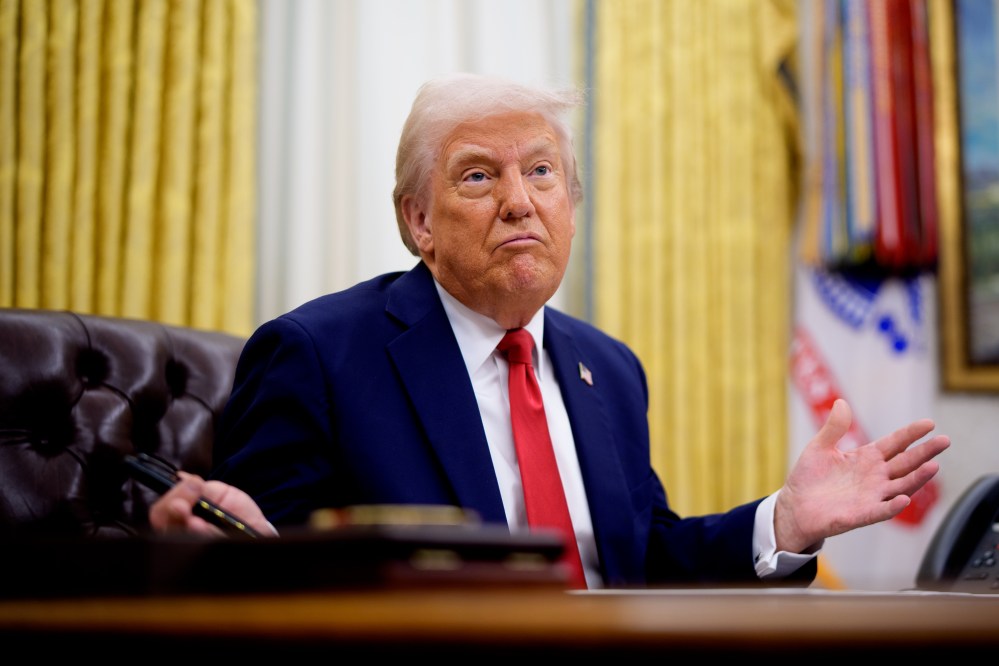


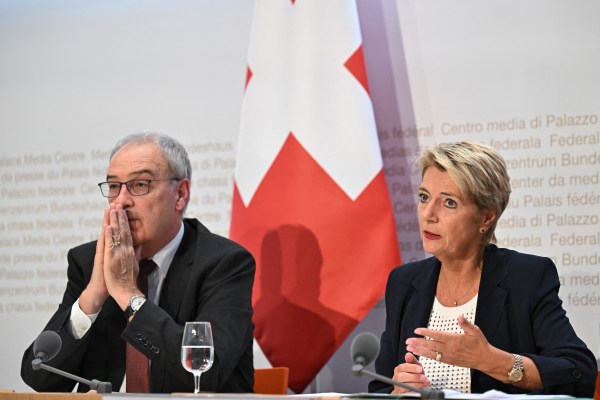
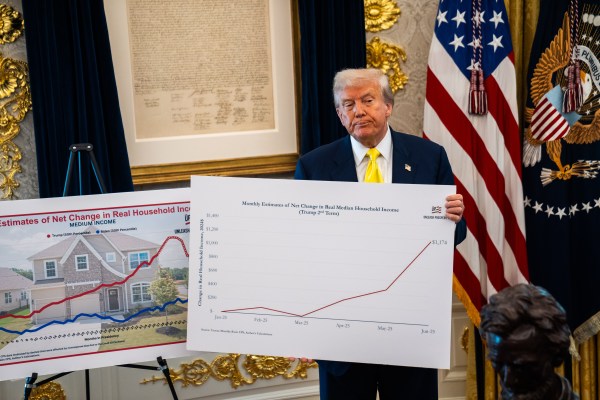
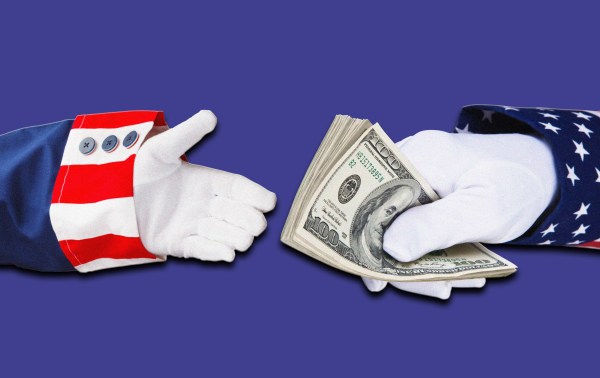
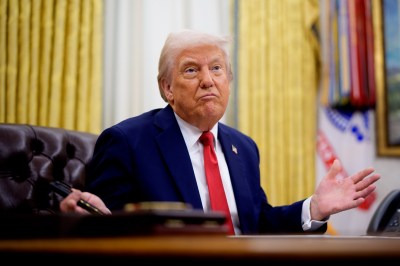
Please note that we at The Dispatch hold ourselves, our work, and our commenters to a higher standard than other places on the internet. We welcome comments that foster genuine debate or discussion—including comments critical of us or our work—but responses that include ad hominem attacks on fellow Dispatch members or are intended to stoke fear and anger may be moderated.
With your membership, you only have the ability to comment on The Morning Dispatch articles. Consider upgrading to join the conversation everywhere.